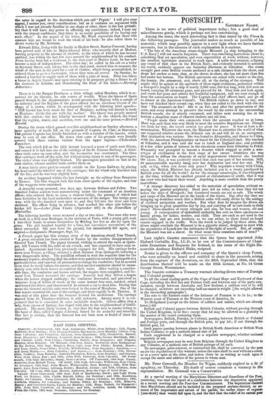POSTSCRIPT.
Among the mass, the most interesting fact is that stated by the Times in the following passages. The journalist makes as much as possible of his material; which may possibly appear in a new light when we have further accounts, but in the absence of such explanation it is curious.
" The fate of the American steam-frigate Missouri [a ship belonging to the
U.:S. Navy] will not soon be forgotten. There was something marvellous about it; something that set speculation, and even superstition at work, without, however, the smallest legitimate material to work upon. A noble war-steamer, eclipsing any vessel of that class in the British Navy, and evidently intended to astonish the world, suddenly appears one Saturday afternoon at Gibraltar. She steets straight past some British vessels anchored at a safe distance from the shore, and drops her anchor so near, that, as she sheers in-shore, she has not more than five feet under her bottom. The British spectators are seized with wonder at the size, the beauty, the armament, and, above all, at the daring of the stranger. Well might they be aghast at the spectacle of these rapid evolutions, performed within a bowsprit's length by a ship of nearly 2,000 tons, 250 feet long, with 350 men on board, carrying 28 enormous guns, and pierced for 44. They look and look again, and count tier guns and admire her beautiful equipment, and are near enough to hear the conversation on board. The Captain and chief officers land, and go off to dinner at the American Consul's. The British visiters go down to tea; and have not finished their second cup, when they are called to the deck with the cry that The steamer's on fire! She is on fire; and after the preservation of the crew, and every attempt to preserve the vessel by the crews of the surrounding British vessels, she is utterly consumed, and before next morning lies at the bottom a shapeless mass of charred timbers and old iron.
" People made their own comments when the account reached us at home.
More was said than was ever likely to meet the sensitive Republican ear. Though too little for war, the vessel seemed too great for peace. It was at least a de- monstration. Wherever she went, the Missouri was to advertise the world of what our respected relative across the Atlantic can do and will do on an emergency. Her destination was various. She was bound to Alexandria, and thence to China, with the American Plenipotentiary on board for the Celestial Court. She touched at Gibraltar, and it was said she was to touch at England also; and probably at a few other points of interest in the circuitous course thin Gibraltar to Pekin. Humanity was prompted to lament a disaster which stopped so noble a mes- senger of civilization in the first stage of her career. Doubtless she was designed to diffuse the elements of social improvement wherever she touched the shore. Na}, it was positively stated that such was part of her mission. Still, an unaccountable mystery hung over her destination and over her end. Why talk so big, when you mean only peace? Why negotiate a treaty with China, when the British Minister has already included you in a treaty purchased by British arms for all the world ? As for the strange catastrophe, it was whispered at the time, without the smallest ground or circumstance of Credit, that it was the crew who had burnt their vessel. Anything is more credible than the purely marvellous.
" A strange discovery has added to the materials of speculation, without re- moving the general perplexity. Dead men tell no tales, at least they did not before the days of Herapath; but foundered vessels are not so safe. The wreak and cargo of the Missouri are in the hands of the divers. Day after day they are bringing up doubtless much that a British sailor will easily divine by the analogy of civilized navigation and warfare. But what does he imagine the divers are bringing up in great quantities day by day, and carrying off in cart-loads to their store? Slave-shackles of every strength and size, for men and women, old and young. A correspondent of undoubted authority has sent us three specimens—a family group, for father, mother, and child. They are such as arc used in the slave-trade, and are own brothers, as we can j swear, to those found on board be vessels engaged in the traffic. Were the wreck to judged by these alone, the divers might conclude the Missouri to be a gigantic slaver, designed to meet with the arguments of Lynch law the intricacies of the right of search. But, of comae, the Missouri was not a slaver. So what mean these countless suits of iron?"


























 Previous page
Previous page